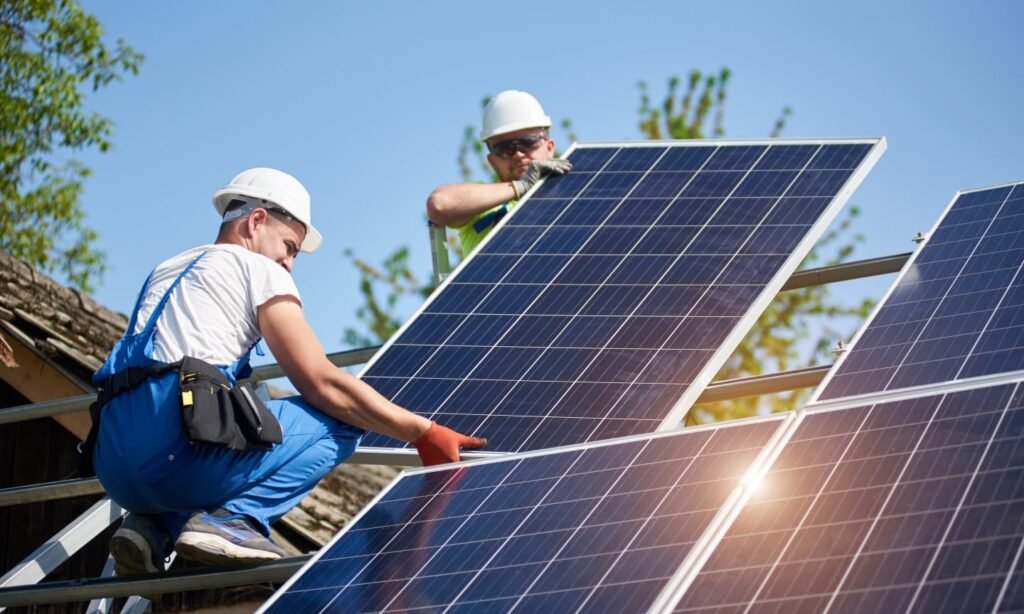The typical cost of residential solar panels in Florida, before the federal solar tax credit, was $33,673 in the second half of 2023. This is lower than the national average of $34,122. The average system size is 14.3 kWs, compared to the national average of 11.6 kWs.
Florida’s primarily humid subtropical climate requires a lot of energy for air conditioning. Installing larger systems makes sense in a state that has one-to-one net metering, which allows customers to offset more of their energy bills with solar. The state’s net metering policies and abundant year-round sunshine have fueled strong adoption of residential solar. Florida has few state tax rebates and solar incentives compared to other states, but customers there may still qualify for the federal tax credit.
Solar costs in Florida at a glance
|
Typical cost of home solar system before federal solar tax credit
|
||
|
Typical cost of home solar system after federal solar tax credit
|
||
|
Source: EnergySage, a solar and home energy product comparison marketplace founded in 2012. Data is from the second half of 2023.
|
||
Costs and trends in Florida
Solar has been having a moment in Florida, part of a general upward trend in interest and installations.
“Florida is ranked third nationally in solar growth, and it is continuing to grow in popularity,” said Wendy Parker, executive director of the Florida Solar Energy Industries Association (FLASEIA), in an email. “Most of the state still has net metering, which makes it very favorable to homeowners.”
System sizes are high in Florida compared to other states, at 14.3 kW on average in the second half of 2023. A contributing factor is the falling cost of solar installations, which went from $2.45 per watt in Florida in early 2023 to $2.35 per watt in the second half of 2023.
System size is also often tied to average monthly energy consumption, which is comparatively high at 883kWh per month in Florida.
“In the past year, prices have been trending down, and levelizing some. Certain equipment has come down in price, and extra competition in Florida has driven costs down from some companies. We’ll have to see what the tariffs do, potentially driving prices back up,” says Dan Massaad, CEO of Guardian Home, an energy-efficient home services and solar installation business in Florida.
Florida established statewide renewable energy goals in 2022 but repealed them in May 2024, Legislation and incentives may vary with the future priorities of new political administrations.
Tax incentives and rebates in Florida
-
Net metering. Florida adopted net metering in 2008, as well as guidelines to allow residential solar to interconnect with utility grids. Net metering allows homeowners to sell excess electricity to the local utility.
-
Property tax breaks. Florida has a property tax incentive for renewable technologies. It ignores the increase in property value due to the installation of solar panels. This savings can add up over time.
-
Tax credits. Florida doesn’t offer state and local rebates or incentives on rooftop solar panels. However, customers may qualify for the federal tax credit.
-
Low-cost loans. Some cities offer solar loan programs. For instance, the City of Tallahassee Utilities offered a 5% loan with a 10-year term for solar panel installations, with a maximum loan amount of $20,000.
-
Related equipment rebates. Providers like the Fort Pierce Utilities Authority also offer flat rebates on solar water heaters.
If you are considering adding a solar water heater along with a solar panel system, it is advisable to look for incentives specific to this type of setup in your area. In Florida, for example, many utility companies offer a generous 1-to-1 credit for excess energy produced by solar panels, making it a financially sound decision for homeowners to go solar.
While Floridians traditionally rely on the grid as a backup power source, interest in battery storage is increasing. Battery storage systems are particularly popular among clients who are concerned about power outages during events like hurricanes. These systems provide the flexibility to power specific rooms or circuits, or even the entire home during an outage.
The average cost of a battery backup system in Florida was $16,887 in June 2024 before factoring in federal tax credits. However, smaller battery systems designed to power essential circuits or equipment can be more cost-effective solutions for addressing specific needs, such as cooling a portion of the house during extreme heat or running critical medical equipment during a power outage.
When choosing a solar panel installer in Florida, it is essential to consider factors beyond just the installation cost. Research the company’s reputation, longevity in the industry, and customer reviews to ensure that you are working with a reputable and reliable provider. The cheapest option may not always guarantee the best service or long-term support for your solar energy system.
In terms of roof compatibility, most standard solar panel mounting systems are suitable for a variety of roof types. However, installations on clay tile roofs, which are common in Florida, may require additional care to prevent damage to the fragile tiles. Be prepared to incur extra labor costs to safeguard the integrity of your roof during the solar panel installation process. following sentence:
She ran quickly to catch the bus before it left.
She hurried to catch the bus before it departed.

